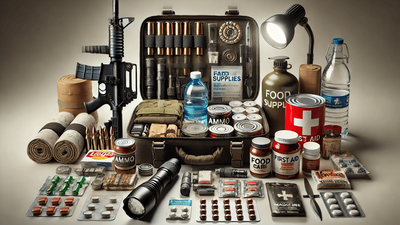In recent years, society has faced an array of unsettling challenges that have shaken the foundations of various sectors. From rampant disinformation and the unchecked influence of big tech to a growing distrust in electoral processes and a concerning shift in educational paradigms, the signs are evident that significant upheaval is occurring. Pop culture and media, once seen as avenues for entertainment and information, are increasingly viewed as conduits for radical propaganda, while the core values of family and community seem to be in decline. These disturbances have left many Americans feeling anxious about their future and searching for ways to safeguard themselves and their loved ones against these emerging threats.
Among all sectors, one of the most afflicted appears to be the American healthcare system, which has suffered severe degradation in recent years. The COVID-19 pandemic, controversial vaccine rollouts, persistent drug shortages, and restrictions on effective treatments have contributed to an erosion of trust. Additionally, the influence of pharmaceutical companies and various global health organizations has raised concerns among the populace, as many feel that their healthcare is being manipulated for ulterior motives. In the face of these challenges, it has become imperative for individuals to take proactive measures to ensure their health and well-being in an increasingly unpredictable environment.
Preparation has never been more critical for Americans navigating the complexities of healthcare. While major health crises such as pandemics receive extensive media coverage, it is essential to recognize that many everyday medical emergencies can also pose serious risks. Conditions such as strep throat, pneumonia, and urinary tract infections affect millions annually, and the need for a comprehensive approach to preparing for these situations is evident. An essential item for any emergency preparedness plan is a medical emergency kit, which can provide vital resources for a range of health issues that may arise unexpectedly.
One company leading the initiative in healthcare preparedness is The Wellness Company, which has introduced a Medical Emergency Kit under the guidance of reputable medical professionals. This kit comprises eight essential medications, including antibiotics and antiviral agents, that can be prescribed by a doctor and sent directly to consumers. Thousands of Americans have turned to this solution, and many have successfully navigated medical emergencies thanks to the availability of these kits. The robust content of the Medical Emergency Kit equips individuals to handle various health scenarios, from minor ailments to potentially severe conditions, empowering them to take control of their health care rather than relying solely on conventional medical systems.
Customer testimonials about The Wellness Company’s Medical Emergency Kits reflect a growing sentiment of reassurance among consumers. Individuals have shared their relief at having a ready supply of medications that can be pivotal in emergencies, even if they have yet to utilize the kit. The sense of preparedness this kit offers speaks to a broader desire for autonomy in health management, especially in a world marked by uncertainty. As many face the reality of insufficient access to healthcare, these kits serve as a potential safety net, designed to alleviate anxiety and provide a sense of security for individuals and families alike.
The pressing nature of these issues cannot be overstated. Americans are encouraged not to wait for preparedness; the time to act is now to safeguard their health and address the rising tide of uncertainty. By investing in a Medical Emergency Kit, individuals can obtain peace of mind and a practical tool that may make a significant difference in times of crisis. With health concerns escalating and trust in traditional systems dwindling, equipping oneself with relevant resources is a vital step toward fostering resilience in unpredictable times. In a world where medical freedom and access to essential treatments are increasingly questioned, it is clear that personal responsibility in health care is paramount, and being prepared is the best way forward.

